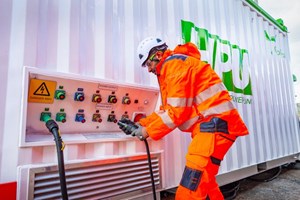News
GeoPura closes £56-MM investment to accelerate UK’s green H2 expansion
GeoPura, the UK-based green H2 pioneer, has completed a £56-MM investment round that will help accelerate the UK’s adoption of green H2 by expanding production capacity, growing the specialist workforce in the UK, and increasing the deployment of its power generation technology.
The UK Infrastructure Bank committed £30 MM to the round, led by a follow-on investment from Barclays Sustainable Impact Capital and supported by GeoPura’s existing investors: GM Ventures, SWEN Capital Partners and Siemens Energy Ventures.
The financing will directly increase the manufacture and supply of GeoPura’s H2 power units (HPUs) at its Newcastle based facility, which replace traditional diesel generators and emit zero harmful emissions. The HPUs have already been successfully supplied to a wide range of high-profile customers including the Ministry of Defence, Balfour Beatty, National Grid and the BBC.
In addition, GeoPura will expand its production of green H2, helping to transform an old coal power station site as part of the HyMarnham Power Green H2 project in the East Midlands. The scaling up of green H2 is vital in helping to meet net zero by reducing emissions in hard to abate sectors – such as in construction and our industrial heartlands and complement renewables by providing supplementary power to the electricity grid.
GeoPura’s HPU technology exemplifies how the transition to sustainable energy can be accelerated, even in the face of grid challenges. As electricity demand increases due to the proliferation of electric vehicles and other clean technologies, supplementary power sources such as the HPU are paramount to provide the capacity required, prevent gridlock and secure a sustainable energy future.
With hubs in Nottingham, Matlock, Sheffield and Newcastle upon Tyne in the UK, GeoPura is mass manufacturing HPUs in collaboration with partner Siemens Energy and plans to deploy a fleet of over 3,600 HPUs by 2033, providing clean, low-cost reliable power, displacing more than 10 MMt of CO2 emissions through their operation over their life.


